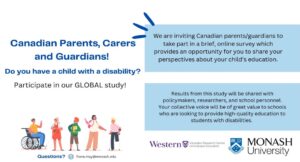I listened to a podcast recently by Arthur C. Brooks with guest Emily Oster
How to Build a Happy Life’: The Right Choices in Parenting – The Atlantic.
This was about parenting in general, not specific to disability, but the concept of “unfunded parenting mandates” interested me.
Emily says ..
And I talk about this as, “unfunded parenting mandates.” Things where you are told, “Here’s all of the 57,000 things you need to do.” And if you add up the time for all of those things, it’s, you know, 72 hours every day. And it’s like, “Well, I only have 24 hours. Like, which of these things should I do?”
The issue with these mandates is not just that you can’t do them all, it’s that they are an undifferentiated mass of “must dos”. Not presented as “this is most important, then if time do this, then this”.
Parents of children with disabilities have all the typical mandates (but some come with with added levels of difficult), PLUS a whole lot more.
One of the things we did when my son (now 29) was younger, was therapeutic horseback riding at CARD (Community Association for Riders with Disabilities)
I don’t remember who recommended it, but it was recommended by more than one person. It’s the kind of activity that parents with kids like my son got recommended to do. It and many other things were the kind of thing that parents like me thought they should be doing because we thought we were supposed to be “doing” many things, and if we weren’t willing to put in the effort maybe we were bad parents and were missing the one thing that would make all the difference.
Was it useful? Maybe a bit.
Was it “leave my job and drive 15 km in city traffic to pick my son up from school in the middle of the school day (because that’s when riding for his age group was), drive 20 km to get him to the other side of the city for a 1 hour horseback ride and have to make up the work time I missed at night” useful? NO IT WAS NOT! I could have been doing any number of easier activities with just as much benefit. (and that’s not counting the hassle to get signed up and the cost).
With the benefit of time and experience, I now realize that many of the things teachers, therapists and professionals (and family members too), recommended were coming from the feeling that they thought they had to recommend something – not because this specific thing was particularly essential, or that they judged it to be worth it for us in terms of time/energy/cost/frustration. So they did recommend something. Worse, I suspect some recommendations were (at least partly) to make me feel like I was doing something positive.
In hindsight I think focusing on any number of local, ordinary activities that kept my son known and connected in community would have had a much bigger impact on his adult life. I wish I had realized that then.

